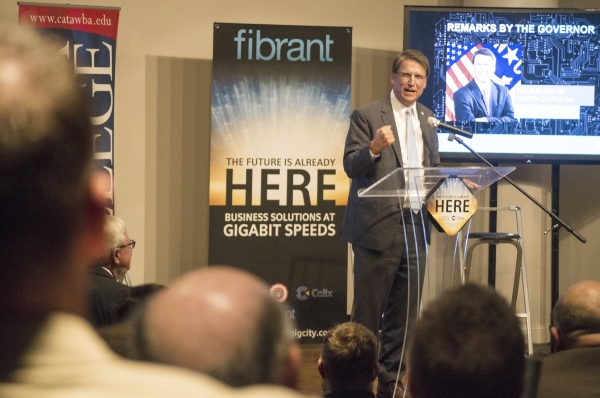Salisbury announces significant upgrade in municipal Internet system
Published 12:10 am Friday, September 4, 2015

- Then-Gov. Pat McCrory speaks during the city's 2015 announcement at Catawba College that Fibrant is able to offer 10 gigabit speeds. Salisbury voters face a referendum on leasing Fibrant to Hotwire Communications. Josh Bergeron / Salisbury Post
Salisbury’s tech-centered slogan — gigabit city — became archaic on Thursday.
Salisbury’s municipally owned, fiber-optic network Fibrant announced during a press conference it had reached 10 gigabit speeds — ten times the maximum amount it currently offers. Fibrant achieved the 10 gigabit per second speed in May, when it purchased new routers for its system, according to Director of Broadband and Infrastructure Services Kent Winrich. The press conference was held at Catawba College, which will be the first user of the lightning-fast speeds.
A number of local and state dignitaries attended and spoke at Thursday’s announcement. The two most prominent figures were Gov. Pat McCrory and Cultural Resources Secretary Susan Kluttz, the former mayor of Salisbury.
The speed upgrade — from a maximum of one gigabit per second to 10 — was heralded by speakers as a way to attract new businesses to Salisbury and North Carolina. McCrory said it’s critical to connect to the rest of the world through technology to remain competitive in economic development efforts.
“I recognize that when you’re bringing in a CEO, the decision makers, to any region of this state you’re competing against other regions of this state and of this country,” McCrory said during the announcement. “They want to be connected and so do their families. They want to be connected to educational opportunities and they want to be connected to talent.”
Doing business in 2015 is less reliant on physical connections and more reliant on electronic connections, he said.
Adding 10 gigabit speeds to Fibrant and, by its ownership of the utility, Salisbury’s arsenal positions the city for new economic growth, said Mayor Paul Woodson.
“It’s the main reason we put Fibrant in five years ago, to try to get ahead,” Woodson said during the announcement. “We’re a small city. We’ve got to do something to bring people in, as all cities do, and we’re hoping this is going to be the key to our future.”
The world may be on the cusp of a second industrial revolution because of the rapid pace of technological advancement, said University of North Carolina at Charlotte Dean of Computing and Informatics Yi Deng, who spoke during Thursday’s announcement.
Speakers during Thursday’s announcement said Salisbury was the first city to offer 10 gigabit speeds to residents and businesses. It may be the first municipally owned network to offer such speeds to residents and businesses. It’s not quite the first to offer 10 gigabit speeds to customers. In 2014, a private company began offering 10 gigabit speeds for $400 to residents of Minneapolis. Similarly, a company in rural Vermont offered the speeds to homes for $400 per month earlier this year.
Currently, Fibrant charges $105 per month for residential customers who subscribe to one gigabit per second speeds. One gigabit speeds cost businesses $1,500 to $1,700, according to Winrich. Salisbury has six residents and three businesses who purchase one gigabit speeds from Fibrant, Winrich said.
Winrich said Fibrant plans to charge $400 for residents who buy 10 gigabit speeds. A definitive, base price doesn’t exist for the 10 gigabit speed, he said. A number of add-ons, such as phone service, affect the price businesses receive. Winrich declined to say how much Catawba might be charged for Internet service at 10 gigabits per second. Catawba staff said they were unaware a price had been decided.
The 10 gigabit speeds could be used for high-tech medical imaging, remote surgery, data centers, extremely high quality video and a number of other purposes, Winrich said. He said Fibrant and city staff would need to educate the public — in and outside of Salisbury – about the potential for 10 gigabit speeds.
For now, Catawba President Brien Lewis said the college doesn’t have any specific plans for the 10 gigabit speeds other than providing Internet on campus. A number of other uses are possible, Lewis said, but none have been planned.
He said the 10 gigabit speeds would “help bring the world to Catawba College.”
Catawba staff said the school currently has a test site for the 10 gigabit speeds. It isn’t available across the campus yet. Even when it is, it’s unlikely that a single, average Internet user on his or her computer would be able to take advantage of the speeds. Modern transfer rates for most hard drives max out below 10 gigabits per second.
Lewis said the speeds could ensure Catawba’s Internet network doesn’t sputter or slow when a number of people are browsing at once.
Winrich said 10 gigabit speeds would help as the world transitions into “the Internet of things” — a term commonly used when multiple devices such as toasters, air conditioning systems, ovens or TVs are connected to the Internet. He said the city and Fibrant are currently reaching out to businesses to use Salisbury as a “test bed” for their operations.
The transition to 10 gigabit speeds came with relatively no additional cost, according to Winrich. Fibrant had already budgeted for a hardware upgrade. Winrich said the city realized while planning for the upgrade it could get higher quality routers to make the speeds possible. It may have cost Salisbury a few extra thousand dollars, he said.
Fibrant’s fiber optic cables are capable of significantly higher speeds than 10 gigabit speeds.
Contact reporter Josh Bergeron at 704-797-4246.

